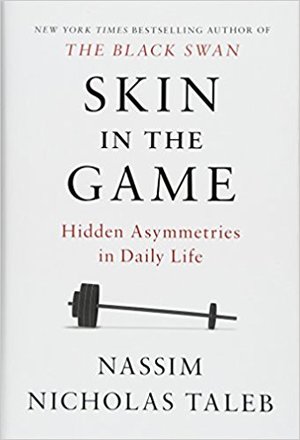
A sign that you may be trading too big for your present emotional capacity





I had just started reading David L. Caplan’s book The New Option Secret: Volatility. But today I merely want to share two powerful images from the book that might make it easier for beginning option traders to understand the impact of time on their position. More experienced traders can empathize.
Let me quote Caplan.
“The short premium trader thinks like a troubled adolescent who cannot wait for the time to pass, and move on to the next stage of life. . . . Each day presents the possibility of a major tragedy. The adolescent thinks, ‘When will it be over?’
“The long premium trader worries like an old man who has not yet left his mark on life, but is still trying to. He knows his days are numbered. . . . He says to himself, ‘If I only had more time.’”


Skin in the Game is Nassim Nicholas Taleb’s (NNT) fifth book in what he calls the Incerto, and it’s the most digestible I’ve read thus far (having read all but Fooled by Randomness). This one focuses more on asymmetry (and symmetry) in everyday life, particularly on the matters of career, ethics, and life in general.
What does that mean? Basically, rules for how to detect if something is pseudo-science (scientism), rules for how you should endeavour to conduct yourself in your career in business, and mental models for thinking about risk in these categories and in life in general.
Having now read most of his books, part of the reason this was digestible was that I’m familiar with his general premises; I would recommend reading his other books first, but this one will tie them together. Highly recommend.

His list of ‘Essential Qualities of the Speculator’ and ‘Laws Absolute” show the timeless value of his insight:
1. Self-Reliance. A man must think for himself,must follow his own convictions. George MacDonald says: “A man cannot have another man’s ideas any more than he can another
man’s soul or another man’s body.” Self-trust is the foundation of successful effort.
2. Judgment. That equipoise, that nice adjustment of the faculties one to the other,which is called good judgment, is an essential to the speculator.
3. Courage. That is, confidence to act on the decisions of the mind. In speculation there is value in Mirabeau’s dictum: “Be bold, still be bold; always be bold.”
4. Prudence. The power of measuring the danger, together with a certain alertness and watchfulness, is very important. There should be a balance of these two, Prudence and Courage;Prudence in contemplation, Courage in execution.
Lord Bacon says: “In meditation all dangers should be seen; in execution one, unless very formidable.”
Connected with these qualities,properly an outgrowth of them, is a third, viz:promptness. The mind convinced, the act should follow. In the words of Macbeth; “Henceforth the
very firstlings of my heart shall be the firstlings of my hand.” Think, act, promptly.
5. Pliability. The ability to change an opinion,the power of revision. “He who observes,”says Emerson, “and observes again, is always formidable.”
The qualifications named are necessary to the makeup of a speculator, but they must be in well-balanced combination. A deficiency or an overplus of one quality will destroy the effectiveness of all. The possession of such faculties, in a proper adjustment is, of course, uncommon. In speculation, as in life, few succeed,many fail. (more…)
 Most traders take price swings personally. They feel very proud when they make money and love to talk about their profits. When a trade goes against them they feel like punished children and try to keep their losses secret. You can read traders’ emotions on their faces.
Most traders take price swings personally. They feel very proud when they make money and love to talk about their profits. When a trade goes against them they feel like punished children and try to keep their losses secret. You can read traders’ emotions on their faces.
Many traders believe that the aim of a market analyst is to forecast future prices. The amateurs in most fields ask for forecasts, while professionals simply manage information and make decisions based on probabilities. Take medicine, for example. A patient is brought to an emergency room with a knife sticking out of his chest – and the anxious family members have only two questions: “Will he survive?” and “when can he go home?” They ask the doctor for a forecast.
But the doctor is not forecasting – he is taking care of problems as they emerge. His first job is to prevent the patient from dying from shock, and so he gives him pain-killers and starts an intravenous drip to replace lost blood. Then he removes the knife and sutures damaged organs. After that, he has to watch against infection. He monitors the trend of a patient’s health and takes measures to prevent complications. He is managing – not forecasting. When a family begs for a forecast, he may give it to them, but its practical value is low. (more…)